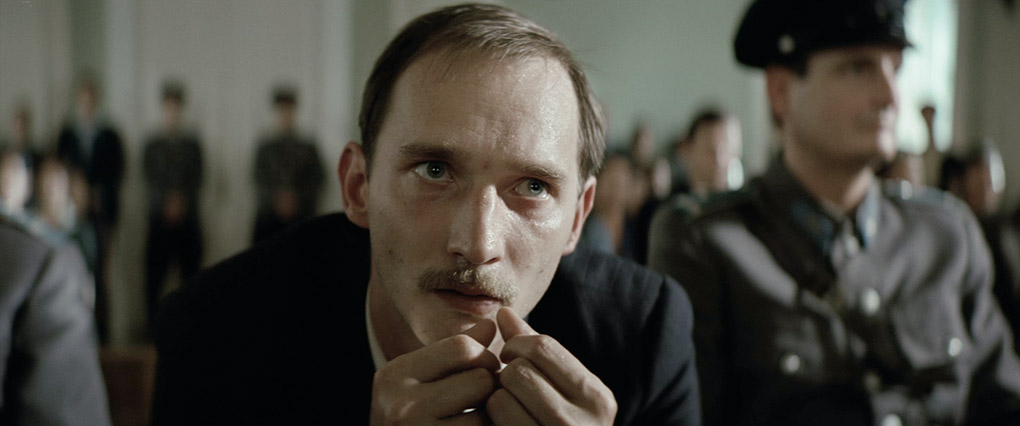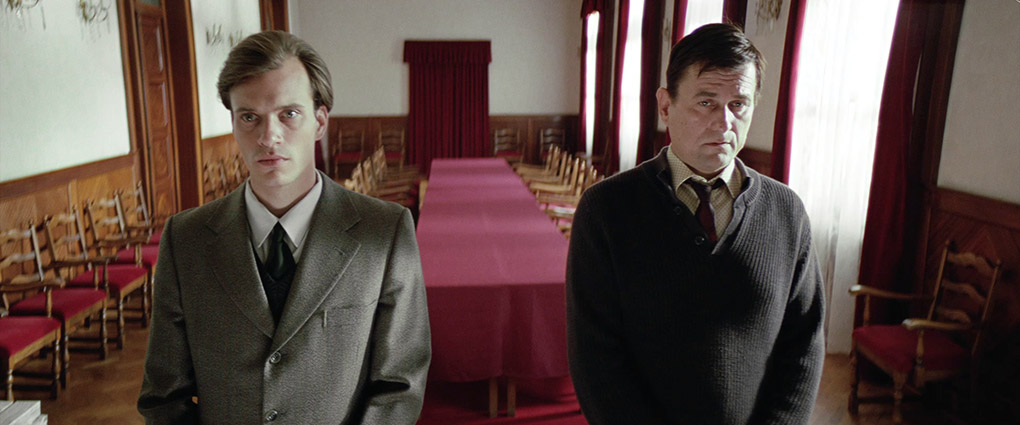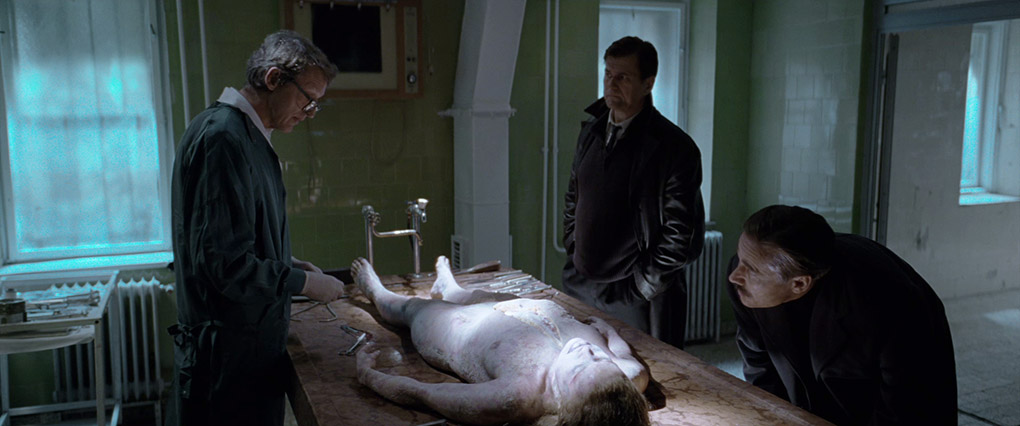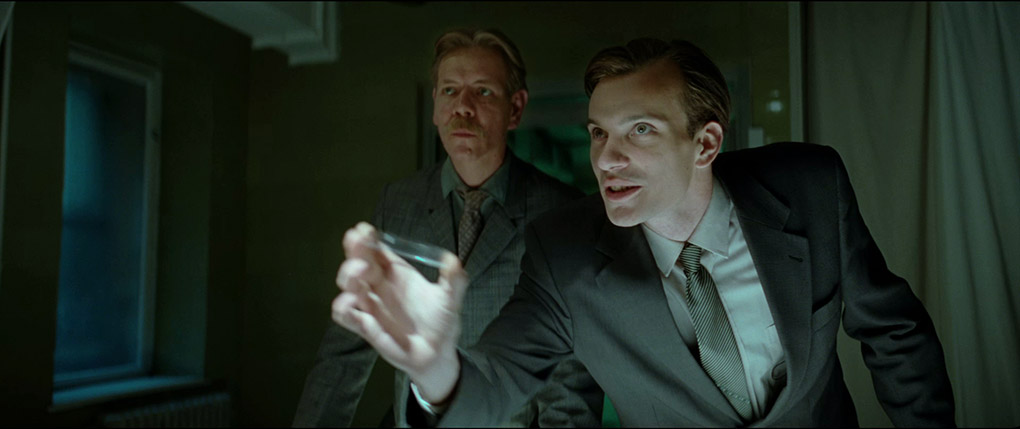|
If you only read the briefest of outlines of the plot of the Hungarian crime thriller Strangled (original title A martfüi rém, which I gather translates as "The Monster of Martfü"), you'd be forgiven for thinking that its story concludes in the opening ten minutes. In 1957, in the small provincial Hungarian town of Martfü, Réti Ákos (Gábor Jászberényi) approaches young Erzsébet as she leaves her shoe factory job and offers to walk her home. It quickly emerges that the two are in a romantic relationship (well, Reti believes they are), one that is soundly terminated by Erzsébet during the course of their walk, a proclamation that does not make Réti happy. The following day, Erzsébet's body is discovered and in seemingly no time at all, Réti has been arrested and charged with her murder. Following some forceful questioning, he confesses to killing her and having sex with her corpse, and even willingly participates in a police re-enactment. Réti is put on trial, where he is found guilty and sentenced to death by hanging. Case closed. Roll credits. Which in a sense is just what happens, as this prologue only takes us to the opening titles.
The film then jumps forward seven years and history looks set to repeat itself when a girl named Ibolya is walking home from the very same factory and is offered a lift by a leather-clad motorcyclist. She accepts and even has no problem with being felt up as they ride. When they stop for a snog and a grope, however, the initially compliant Ibolya starts protesting at the over-aggressive nature of the seduction. The man responds by killing and raping her and then throwing her lifeless body into the river. Local cop Bóta Nyomozó (Zsolt Anger) is put in charge of investigating the case, a task in which he is joined by eager young prosecutor, Szirmai Zoltán (Péter Bárnai), who has been selected for the job by Nyomozó's newly promoted partner, Gábor Katona (Zsolt Trill). Réti, whose sentence has been commuted to life imprisonment, continues to languish quietly in jail.

There are echoes of Bong Joon-ho's Memories of Murder in the setup and the case itself. Both films were inspired by real-life serial killer cases in countries whose official stance on such murder sprees was one of denial, and both are investigated by a bullish local detective and a more studious younger newcomer, with whom the local man inevitably bumps heads. Here, however, it's not just an issue of professional pride, as despite his confession and a re-enactment that seriously creeps out the woman playing the victim, it quickly becomes clear that Réti is not guilty of the crime of which he has been convicted and that confirmation of this will reflect badly on Nyomozó and be damaging to his career. Thus, when Zoltán starts finding connections between the earlier crime and the ones they are now investigating, he is told in no uncertain terms by Katona – now the district attorney – to leave that now firmly closed case well alone and focus only on the more recent crimes.
Having initially concealed the identity of the killer, the film then surprises by following him home after an attack on a third factory worker is disrupted by her screams and the quick arrival of help, an encounter that is set to rebound on the attacker in an unexpected manner. From this point on, the film divides its time between the criminal's nefarious activities, the specifics of the investigation, and the question of why Réti not only confessed to the first murder but also believes that he deserves to be punished. It's a consistently compelling brew, as Zoltán's increasing frustration is contrasted with the appalling self-confidence of the killer, who is able to lure women into his vehicle because he is known to them all as a good-natured family man and not someone any of them would instinctively suspect. Réti, meanwhile, who has been persuaded by visits from his loyal sister Rita to appeal his sentence for the sake of his son, is battling steadily encroaching despair as each appeal is summarily dismissed.

While the political situation of early 1960s Hungary does not sit front and centre, it subtly underscores the investigation nonetheless, as a confidential chat between Zoltán and a superior begins with an almost instinctive sweep for bugs, an uncooperative Nyomozó is ordered to spy on his younger colleague and demands from up high for a speedy resolution put pressure on the police to find a suspect at any cost. "You mustn't undermine the public's faith in the legal system," Zoltán is told at one point, while his conviction that they are looking for a single suspect is met with the angry and unhelpful proclamation, "There are no serial killers in this country! Is that clear?"
Some have complained that the film is overlong, but with four narratives on the go (Nyomozó and Zoltán tend to go their separate ways), there is more than enough story and content to justify its two-hour running time, and director Árpád Sopsits expertly develops and interweaves them. He most effectively contrasts our frustration at the bureaucratic stubbornness that so impedes the investigation with our creeping horror at attacks that are always victim focussed and our evolving sympathy for the guilt-ridden Réti's fate. Sopsits also walks a fine line on the more extreme assaults, never shying away from their necrophilic element while at the same time avoiding taste-busting explicitness and always cutting away just before things gets too ghoulish. Increasingly, there's the sense that the killer and the visually similar Réti are on opposing sides of the same religiously themed coin, casting the killer in a demonic light whilst the innocent Réti suffers for his sins. This reaches a fascinating allegorical peak when the killer pays Réti a visit in prison, seemingly curious about the man who has chosen to endure such punishment in his place. 
Working both as a darkly toned serial killer thriller and a politically underscored police procedural, the cannily retitled Strangled (a moniker that works both literally and metaphorically) really delivers, consistently gripping as a character drama, but also appropriately disturbing and even exciting when it needs to be, aided by a string of solid performances, Sopsits's assured direction and Gábor Szabó's moody scope cinematography. Given that this was made the same year as Attila Till's impressive Kills on Wheels, also recently released on Blu-ray by Montage Pictures, it almost feels as if we might be on the brink of a renaissance for Hungarian genre cinema.
Another top-notch transfer from Eureka's Montage Picture label, the 2.40:1 1080p image here is in pristine condition, boasting consistently sharp detail and a finely judged contrast balance that keeps things clear even when the light levels drop without softening black levels, crucial for a film with so many key scenes set at night or in dimly lit interiors. The often-muted colour palette plays as a reflection of the everyday drabness of the setting and period and is pleasingly rendered here. Research suggests Strangled was shot on 35mm film rather than digital, but I'm guessing this transfer was mastered from the negative on completion of the editing as there's not a mark or dust spot to be seen.

The original Hungarian soundtrack is available either as in Linear PCM 2.0 stereo or DTS-HD Master Audio 5.1 surround. Perhaps because the film is not awash with loud music and showpiece action scenes, there is surprisingly little difference between the two tracks – both boast an excellent clarity and dynamic range, through the LFE work does give the surround track punchier bass when required.
Clearly rendered optional English subtitles kick in by default.
Trailer (1:46)
A thrillingly edited trailer that suggests the film is far more quickly paced than it actually is, but which gives nothing crucial away and would certainly get me buying a cinema ticket.
I may pine for a little more in the way of extras on Eureka's Montage Pictures discs, but the choice of films being released on the label really can't be faulted. Strangled is one of the label's best titles yet, a rivetingly told tale that I gather sticks surprisingly close to the facts but is still as gripping and disturbing as any fictional crime drama I've seen in some time. Trailer aside, we only get the film on this disc, but it's impeccably transferred, and for that and the film itself this has to come enthusiastically recommended.
|